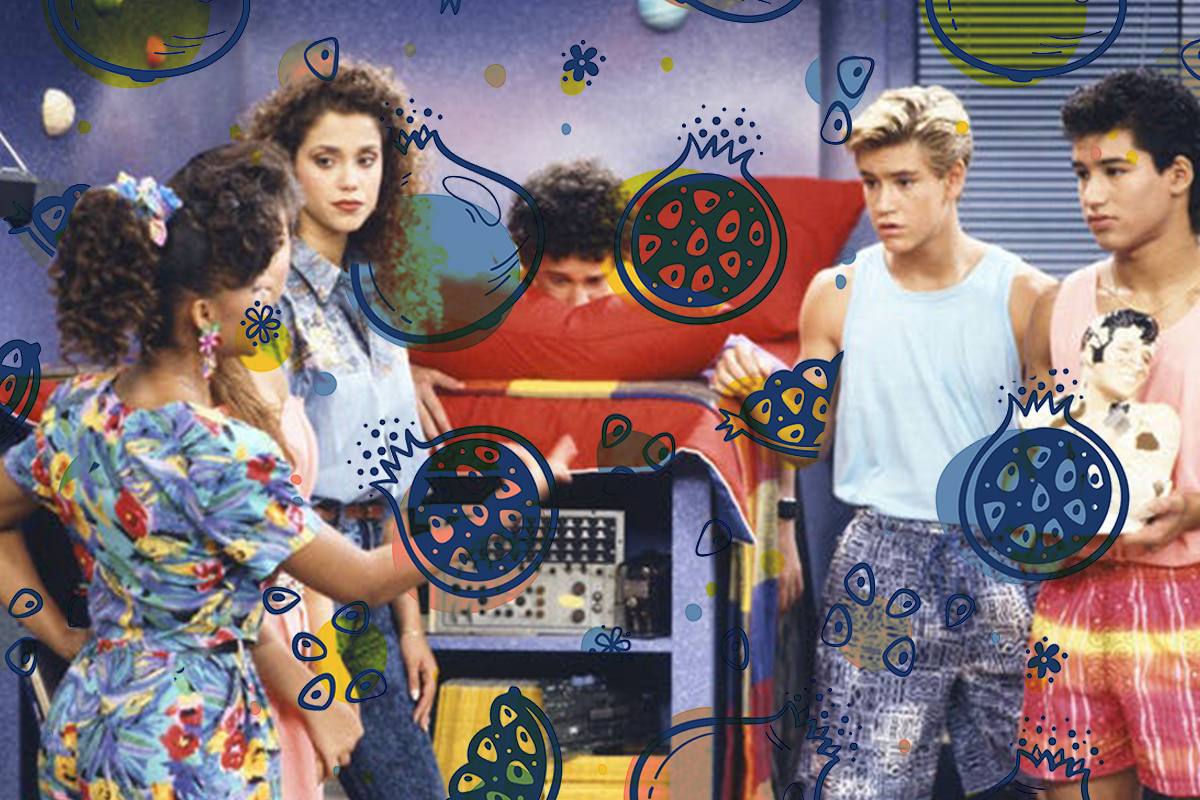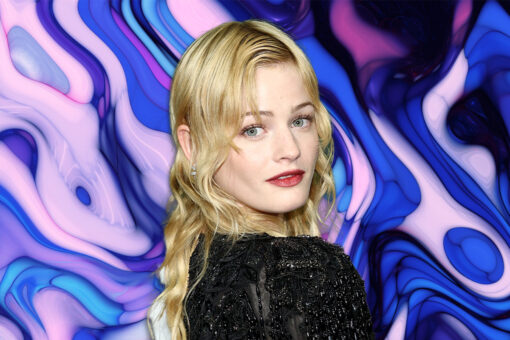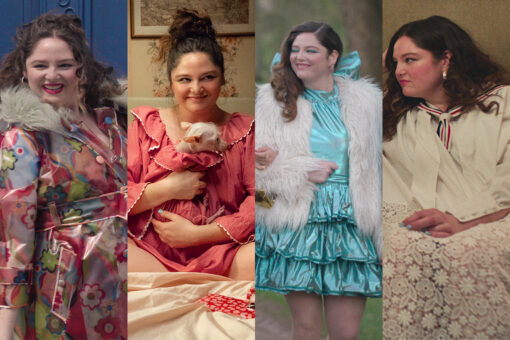As a child of the ‘90s, the master text of my youth was Saved by the Bell, henceforth referred to as SBTB, a show in which there were zero Jewish main characters. For those of you born after the series ended in 1993, SBTB is a neon teen dream set in the fictional town of Bayside, California. Its hero is the puckish Zack Morris, played by Mark-Paul Gosselaar. Zack is a lovable scamp, constantly wrangling his friends into mostly harmless schemes and invariably being forgiven for the harm he blithely causes.
In one such scheme, Zack pretends to be Jewish to attend a baseball game on what happens to be Rosh Hashanah.
Yeah, we’re gonna have to break that down.
Comedy writer Dashiell Driscoll claims that this special episode inspired him to create his popular Funny or Die series, Zack Morris is Trash. Upon rewatching it in the year 2020, I’m here to say that this Rosh Hashanah episode is pretty offensive, but not because of the holiday storyline.
Titled “Wicked Stepbrother: Parts I and II,” the Rosh Hashanah plot is actually secondary to a story involving Zack’s friend Jessie Spano, whose mother has recently remarried. Along with her new husband, Jessie’s mom brings back to Bayside a stepson, Eric, the same age as Jessie and her friends. Eric is from New York. He wears a leather jacket and is rude. He’s played by Joshua Hoffman, an actor who had bit parts in a couple other ‘90s teen shows like Blossom and Step by Step, but never did much else. He’s swarthy, with dark, longish, wavy locks establishing a foil to the bleach blond Zack Morris. He’s cultured, explaining that he used to “go to the classic movies all the time in New York.” He takes Lisa on a date to see Casablanca, a Nazi-resistance love story. And he calls Slater, his stepsister’s beefcake boyfriend, a “yutz.” I didn’t pick up on it as a kid, in part because I was so delighted to hear references to Rosh Hashanah on my favorite show, but re-watching it as an adult, it’s clear that Eric is coded as stereotypically Jewish.
The explicitly Jewish plot is set in motion when a teacher explains, in a meaningful though inexplicable Long Island accent, “Tomorrow is the Jewish holiday of Rosh Hashanah. And since [shrugs and raises Groucho Marx eyebrows] I’m Jewish, I’ll be home celebrating the New Year. Those students who are Jewish, please raise your hand so I’ll be able to tell the substitute teacher about your absence.” When Zack recognizes this as a get-out-of-school-free card and raises his hand, the teacher’s face lights up with the unmistakable joy of learning that an acquaintance is Jewish. (For the record, Mark-Paul Gosselaar is Jewish; his paternal great-grandparents were both murdered in the Holocaust.)
Eric becomes enmeshed in Zack’s scheming after watching the game on TV. The stadium camera shows Zack when he catches a fly ball hit by right fielder Darryl Strawberry. The next day, as Zack strolls down the hallway nonchalantly tossing his souvenir ball up and down, Eric confronts him:
Eric: Thanks to your religious experience, I’ve just inherited your locker.
Zack: Ooh, you must be dreaming.
Eric: Well, actually, I did have this dream about you cutting school to go to Temple Beth Dodgers Stadium.
Zack: What?!
Eric: Is that the ball you caught off Rabbi Strawberry’s bat?
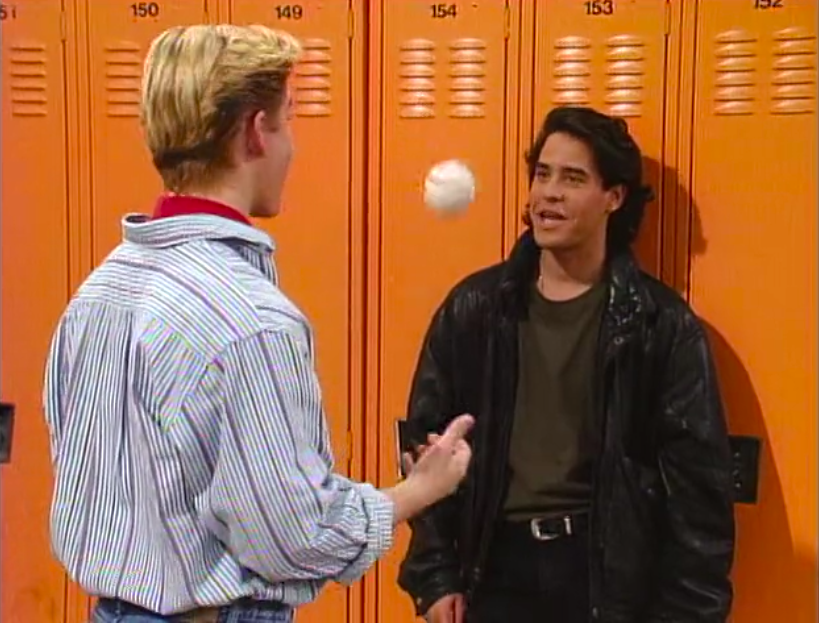
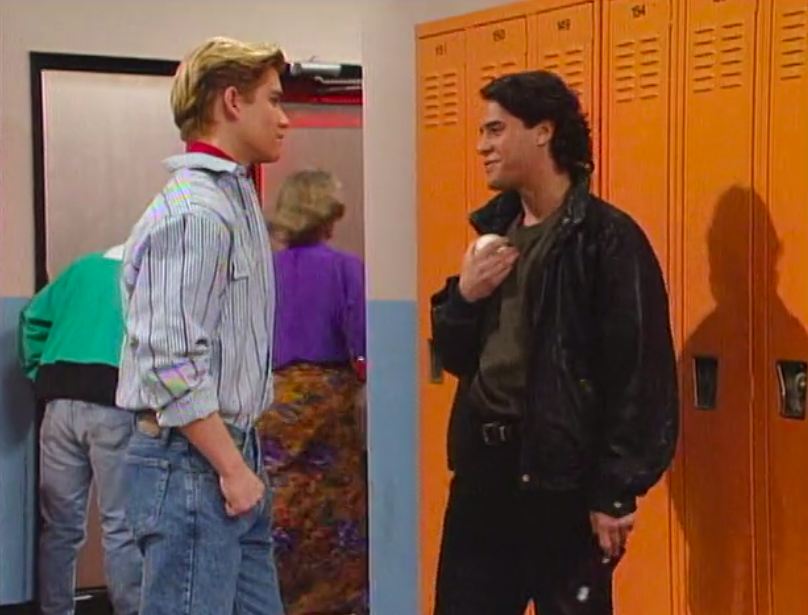
Eric begins to blackmail Zack, as well as the rest of the gang, until it escalates into a high-stakes prank war. Eric requisitions Jessie’s room, steals her diary, and later records her necking with Slater (audio only), threatening to play it over the loudspeaker at school. Zack tricks Eric into driving their principal’s new car, intending to get a photo of the illicit joyride, but Eric lets his crush Lisa (whom Zack had bribed into going on a date with Eric) drive, and Lisa crashes. Eric then has the car completely taken apart in shop class, stymying Zack’s plans of a quick repair. Now it looks like Zack is facing expulsion, all for the victimless crime of attending a baseball game on a school day, a day when, arguably, the school should have been closed altogether.
In terms of scheming, Zack and Eric are equals. And yet, whereas Zack’s schemes are characterized as happy-go-lucky capers, Eric’s machinations are dark and sinister. And this is the only storyline in the entire six-season span in which Jewishness exists as a category, as a concept. When Lisa finds out about her friend’s Rosh Hashanah ruse, she declares, to the thrill of my pre-teen self, “Zack, you are meshugenah.” There’s another great line, when Zack’s best friend Screech identifies him in the TV footage as “the one with the Dodger blue yarmulke.” Yiddish in mainstream, contemporary media? My whole family kvelled to see it.
But that cultural literacy is exactly why the rendering of Eric as a Jewish evildoer is so troubling — and so familiar. Consider Shakespeare’s The Merchant of Venice. The play is set during the playwright’s lifetime, that is, in the late sixteenth century, when Venice’s sizable and historic Jewish population was made to live in a confined district, the original ghetto, and obey laws designed to limit their social mobility. The antagonist (?) Shylock is a usurer, meaning he engages in a type of for-profit moneylending that was proscribed by Christian standards, but on whose services Christians nevertheless depended.
Shylock is relentlessly harassed and denigrated by his Christian Venetian neighbors, and so when one of them, the speculator Antonio, seeks to borrow money, Shylock sets peculiar terms: If the loan is not repaid in full, Antonio must pay with a pound of his own flesh. It is bizarre and performatively cruel, an assertion that, if you treat someone like a villain, they will not disappoint you.
The Merchant of Venice ends uneasily. Shylock is publicly humiliated in the courtroom, where it’s argued that, although he has a legal right to collect on Antonio’s debt, to do so would be unmerciful and barbaric — or in a word, un-Christian. The court orders Shylock to either surrender his own wealth or convert to Christianity. Such as he is, Shylock cannot exist in this society. He must be destroyed or fundamentally transformed.
As in 16th-century Venice, so in mid-‘90s Bayside. This school isn’t big enough for two schemers, so Eric has only two choices: reform or GTFO. Actually, he tries both. After getting punched in the face by his stepsister, Eric has a change of heart and fixes the principal’s car. He then admits defeat, saying, “Look guys, I don’t fit in around here so I’m moving back to New York.” But the whole wholesome gang decides to give Eric a second chance, with Zack delivering an invitation that is at once insulting and accepting: “You know what Eric? I called New York and they don’t want you back. I think you should stay.” So Eric “converts.” He agrees to stay in Bayside, in an obligatory truce with Zack. He gives Jessie her room back, taking down from the walls two potent symbols of his New York identity: posters of the Mets and the Misfits.
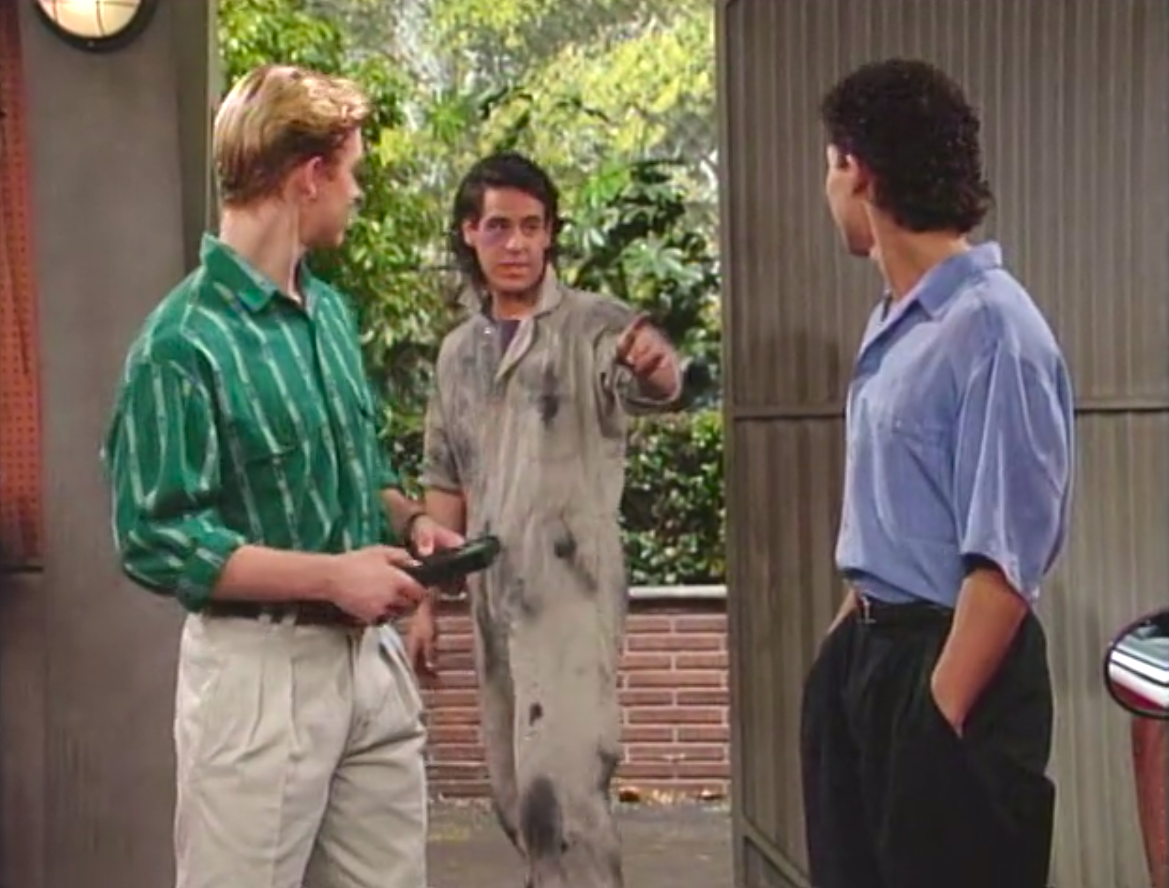
Of course, we never actually see him again, but that’s par for the SBTB course. The show was so little concerned with continuity, they famously allowed two beloved characters to disappear for the majority of the final season, only to have them return with no explanation for the graduation finale.
But what does this temporary acknowledgment of Jewishness mean? Jewishness is let in for the sake of an innocuous joke, but its presence, which unravels into a mess of funny Yiddish words, cultural associations, and casual stereotypes, comes to feel like an intrusion. You don’t watch SBTB for its nuanced handling of complex issues — and it was the ’90 after all, when things like proper representation in media weren’t handled with as much nuance as the TV writers of today (at least attempt to) bring.
Maybe American Jewishness will always be decimated by bad TV writing. But a world of difference separates SBTB from Shakespeare, and their Jewish characters still end up the same way. This Rosh Hashanah, I’ll be thinking about the fictional Jews that make up our cultural heritage. Better endings for them means new beginnings for us.
Header Image design by Emily Burack. Screenshot via NBC; pomegranate Rosh Hashanah pattern via Getty Images.
